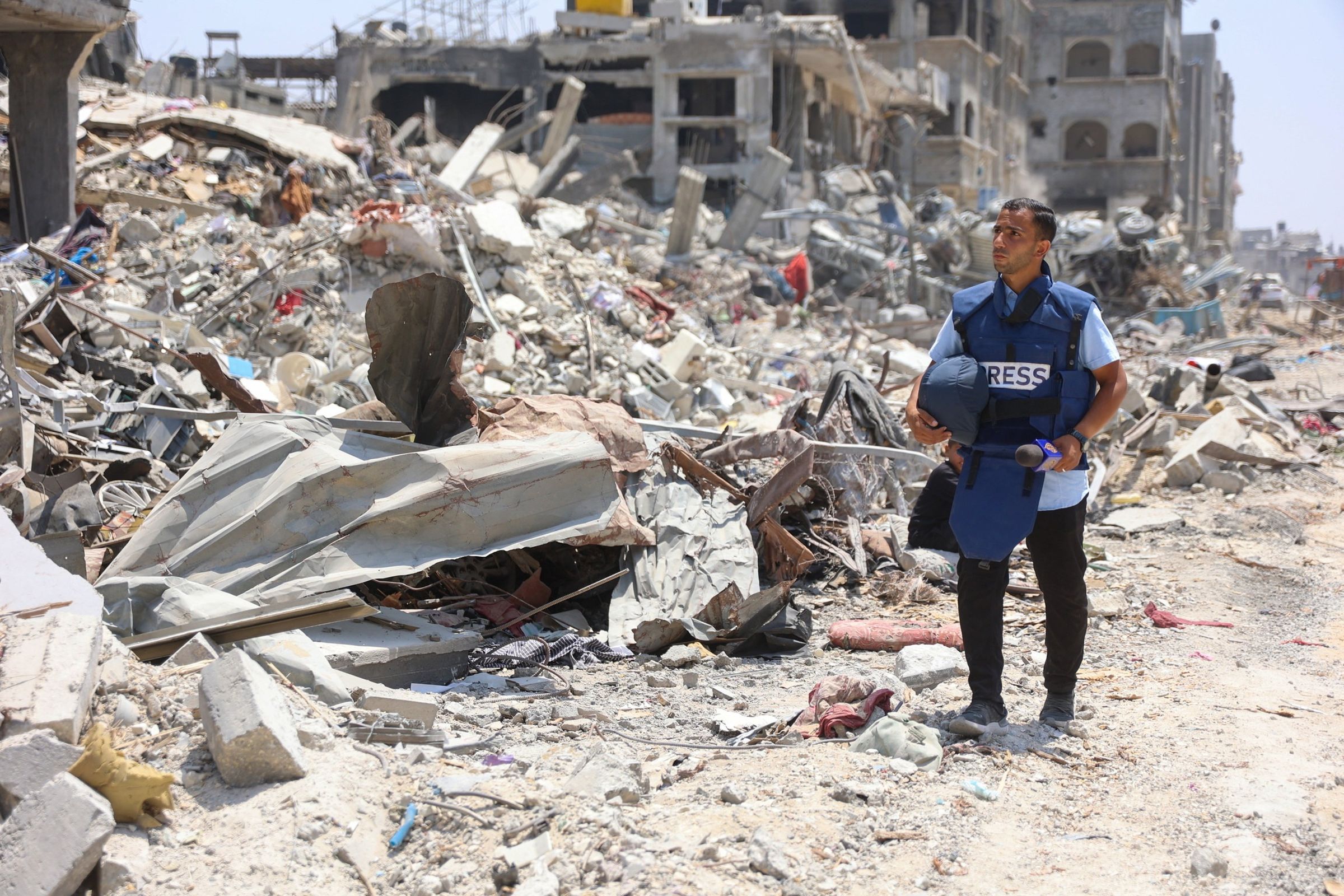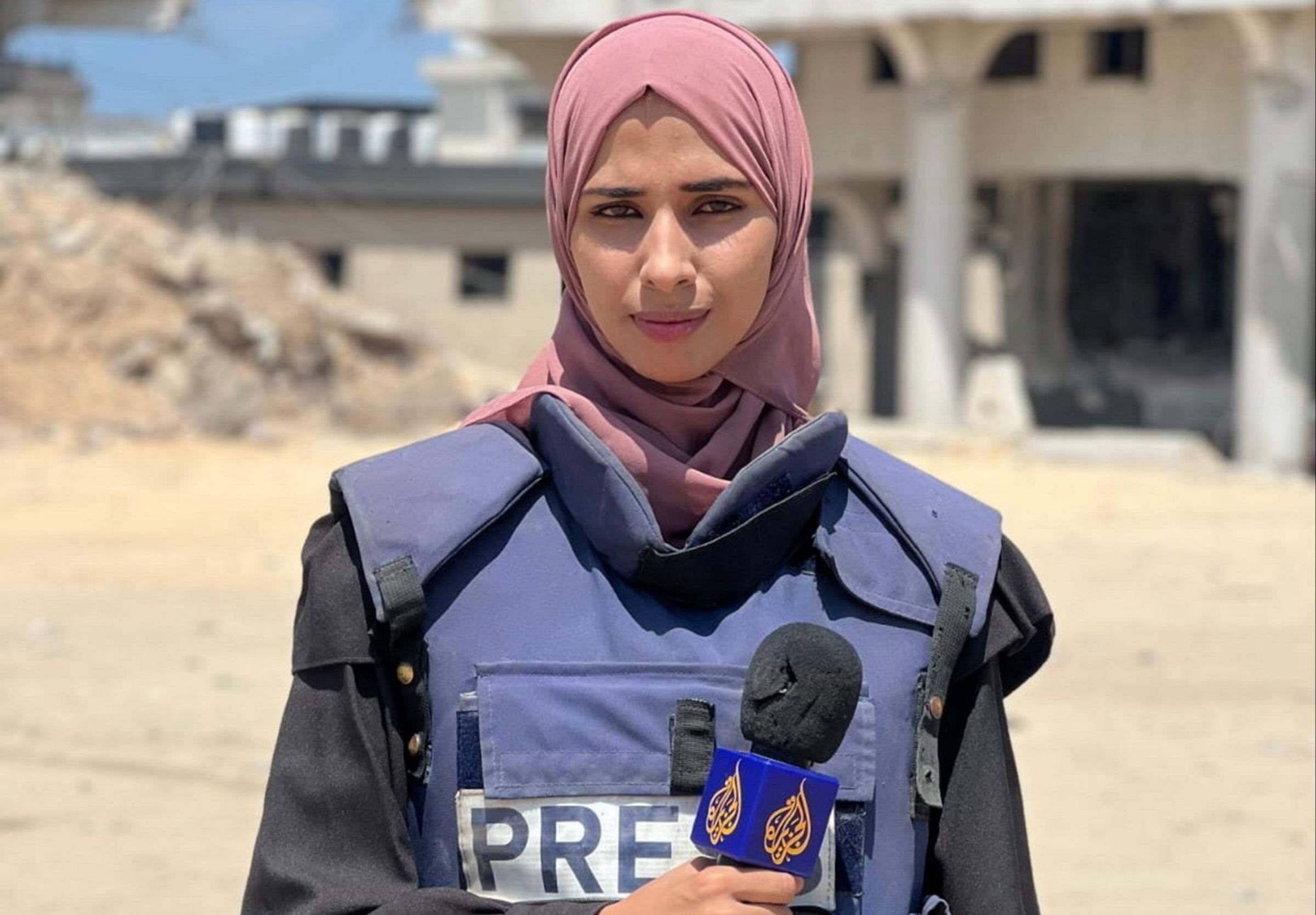Shortly after Israel assassinated Anas al-Sharif, one of Al Jazeera’s best-known Gaza correspondents, his newly-appointed successor Nour Khaled had to make a grim choice.
Meeting in their hastily repaired makeshift media tent outside Gaza City’s Shifa Hospital — the very spot where Sharif, four colleagues and two freelancers were killed last month — Khaled and her nine surviving colleagues debated among themselves.
Should they flee south, or stay to document the coming Israeli invasion of the besieged enclave’s largest city, “until the last person leaves . . . to carry their voice and tell their story”?
“I prefer to remain,” said Khaled, a 27-year-old so malnourished that her press vest — one of the few the channel still has in Gaza — hangs loose over her slight frame. She told the Financial Times: “If I stay, it does not mean I seek death, but that I am committed to covering the story.”
The peril is clear. Israel has killed at least 189 Palestinian journalists and media workers in Gaza since Hamas’s October 7, 2023 attack that triggered the war, according to data from the New York-based Committee to Protect Journalists.

At least 26 were directly targeted, said the CPJ, which classifies the cases as murders and is investigating 20 more such instances.
Dozens of others were killed while doing their job, with the rest among what local officials say are the 63,000 Palestinians who have been killed in the war.
The pace of killings is unparalleled. Israel has killed roughly the same number of journalists in 22 months of war as were killed over two decades of conflict in Iraq, according to media advocacy groups.
Nor has the danger abated under international outrage.
Israeli forces last week fired several projectiles at a well-known location for live shots at the Nasser Hospital Complex, killing five journalists — including contributors to Reuters, the Associated Press and Al Jazeera — and more than a dozen first responders, according to health officials.
After first describing it as a mishap, Israel claimed it had killed six militants. It provided no evidence, and declined to reply to a detailed list of follow-up questions about this and other incidents in which it has killed journalists.
The BBC, AFP and others have also warned about the dangers to their journalists in Gaza, including from starvation.
For Al Jazeera, the threats have been many, and specific — especially for its Arabic language channel, which is watched by hundreds of millions in the region.
The Qatar-funded news outlet has become the dominant broadcast chronicler of Israel’s offensive in Gaza, transforming its correspondents into Palestinian icons.
The Israeli military has accused six of its employees — including Sharif — of being “terrorists”, and has killed 10 Al Jazeera journalists and media workers.
It calls the channel an outlet for Hamas propaganda, claiming it has “proof of the integration of Hamas terrorists within the Qatari Al Jazeera media network”. Hamas killed 1,200 people and seized 250 hostages during its October 7 attack.
No major independent journalism or human rights groups have found the evidence Israel has released — screenshots of so-called payslips, for instance — to be credible. The CPJ said the IDF has not replied to its requests for more information.
“There are nearly a dozen journalists who are on the smear lists,” said Sara Qudah, a regional director for the CPJ. “And those journalists are now fearing for their lives.”
Khaled says fear grips her life. Over 22 months of war, Israeli warplanes have killed three of her brothers, destroyed the journalist’s home and left her family homeless. Last week, an Israeli bomb hit near where her family was sheltering and “I became hysterical”, she said.
By taking the Al Jazeera job, Khaled knows she has walked into a potentially deadly spotlight. “I can’t hide that my mother is scared for me because journalists have become targets,” she said. “Any place we go to could be a target.”

Al Jazeera’s team in Gaza swelled from roughly two dozen employees before the war to about 130 currently. These include drivers, technicians, camera crew and new correspondents, said Tamer Almisshal, who started his career in Gaza before moving to Doha and now oversees coverage of the war.
The expansion was mostly because Israeli displacement orders and combat operations meant small reporting teams could no longer move freely around the enclave, he said.
Israel has denied foreign journalists independent access to Gaza, and will not allow broadcast equipment through its blockade.
Even Al Jazeera’s deep pockets have struggled to overcome the practical hurdles of reporting from a besieged war zone: two correspondents in southern Gaza share a single microphone, cameras are falling apart and satellite trucks need replacement parts.
Misshal estimates that 90 per cent of his employees have had their homes destroyed, and nearly all are malnourished — all while trying to support large families.
Moamen al-Sharafi, one of eight Arabic-language correspondents, lost 22 members of his family, including his parents and siblings, in a December 2023 bombing.
He stayed on in Gaza, but when he tried to rent an apartment for his wife and children, he was turned away — people are worried that living near an Al Jazeera journalist will invite Israeli bombardment.
“At the last minute, as I was going to give him the money, the landlord called to say ‘I am sorry, I did not know you are an Al Jazeera journalist,’” he said.
In one instance, Al Jazeera said one of its correspondents, Ismail al-Ghoul, was detained by Israeli forces in early 2024 and interrogated over alleged ties to militants.
He was released within hours, only to be assassinated four months later in an air strike by the Israeli military, which then repeated the claims.
The IDF never arrested Sharif, as it has thousands of Gazans it suspects of militancy. It has claimed that past intercepted documents showed his membership in Hamas, but provided no evidence he was involved in militant activities during the current conflict.
The laws of war only permit the killing of journalists if they are directly involved in ongoing hostilities, said the CPJ’s Qudah. The IDF did not accuse the six journalists killed alongside him of anything, which the CPJ argues makes their killings a war crime too.
After their deaths, Khaled said, “something was born inside me that said that I have to complete the journey for which they sacrificed their lives”.
It is the reason she accepted the job, despite the danger, she said. It is the same reason she and the rest of the Al Jazeera team finally decided to stay in Gaza City, despite the approaching Israeli tanks.
“If I am silent as a journalist, will it keep me safe?” Khaled asked Misshal before choosing to remain. “Silence won’t guarantee my safety.”